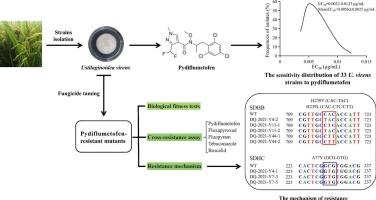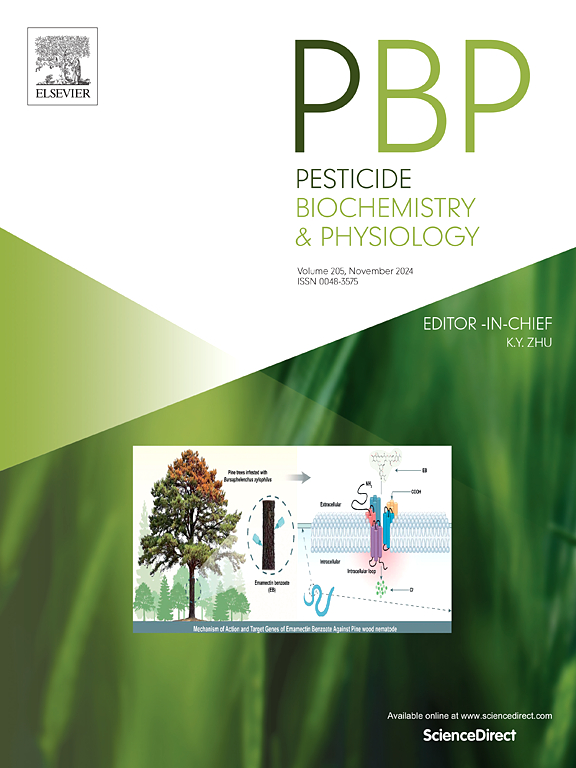Resistance risk and mechanism of Ustilaginoidea virens to pydiflumetofen
IF 4.2
1区 农林科学
Q2 BIOCHEMISTRY & MOLECULAR BIOLOGY
引用次数: 0
Abstract
Rice false smut, caused by Ustilaginoidea virens, is a devastating fungal disease in rice that not only leads to yield reduction but also poses a serious threat to food safety and human health due to the production of numerous mycotoxins. Pydiflumetofen, one of the most promising SDHI fungicides widely used for controlling various plant diseases, lacks available information regarding its antifungal activity against U. virens and the potential risk of resistance development in this pathogen. In this study, we evaluated the sensitivity of 33 field-isolated strains of U. virens to pydiflumetofen using mycelial growth inhibition method and assessed the potential for resistance development. The EC50 values for pydiflumetofen against the tested strains ranged from 0.0032 to 0.0123 μg/mL, with an average EC50 value of 0.0056 ± 0.0025 μg/mL. In addition, four strains of U. virens were randomly selected for chemical taming to evaluate their resistance risk to pydiflumetofen, resulting in the successful generation of eight stable and inheritable resistant mutants at a frequency of 1 %. These mutants exhibited significant differences in biological fitness compared to their respective parental strains. Cross-resistance tests revealed a correlation between pydiflumetofen and fluxapyroxad as well as fluopyram, but no evidence of cross-resistance was observed between pydiflumetofen and boscalid or tebuconazole. Therefore, we can conclude that the risk of resistance development in U. virens to pydiflumetofen is moderate. Finally, the target genes SDHB, SDHC, and SDHD in U. virens were initially identified, cloned, and sequenced to elucidate the mechanism underlying U. virens resistance to pydiflumetofen. Three mutation genotypes were found in the mutants: SDHB-H239Y, SDHB-H239L, and SDHC-A77V. The mutants carrying SDHB-H239Y exhibited low resistance, while SDHC-A77V showed moderate resistance, but the mutants with SDHB-H239L demonstrated high resistance. These findings contribute significantly to our comprehensive understanding of molecular mechanisms involved in the resistance of U. virens to pydiflumetofen, and provide an important reference for chemical control strategies against rice false smut in the field.

Ustilaginoidea virens 对吡虫啉产生抗药性的风险和机制
水稻假穗状病毒病是由水稻假穗状病毒(Ustilaginoidea virens)引起的一种毁灭性真菌病害,不仅会导致减产,而且会产生多种真菌毒素,对食品安全和人类健康构成严重威胁。吡氟螨酯是最有前景的 SDHI 杀菌剂之一,被广泛用于控制各种植物病害,但目前尚缺乏有关其对 U. virens 的抗真菌活性以及该病原体产生抗药性的潜在风险的信息。在这项研究中,我们采用菌丝生长抑制法评估了 33 株从田间分离出来的葡萄孢菌对吡氟螨酯的敏感性,并评估了其产生抗性的可能性。吡虫啉对受试菌株的 EC50 值介于 0.0032 至 0.0123 μg/mL 之间,平均 EC50 值为 0.0056 ± 0.0025 μg/mL。此外,还随机选取了四株紫云英进行化学驯化,以评估其对吡氟螨酯的抗性风险,结果成功产生了八个稳定且可遗传的抗性突变体,频率为 1%。与各自的亲本菌株相比,这些突变体在生物适应性方面表现出显著差异。交叉抗性测试表明,吡虫啉与氟虫酰胺和氟吡菌酰胺之间存在相关性,但没有发现吡虫啉与啶虫脒或戊唑醇之间存在交叉抗性。因此,我们可以得出这样的结论,即蝽对吡虫啉产生抗药性的风险是中等的。最后,我们初步鉴定、克隆并测序了病毒脲的靶基因 SDHB、SDHC 和 SDHD,以阐明病毒脲对吡虫啉产生抗性的机制。在突变体中发现了三种突变基因型:SDHB-H239Y、SDHB-H239L和SDHC-A77V。携带 SDHB-H239Y 的突变体表现出低抗性,SDHC-A77V 表现出中等抗性,但携带 SDHB-H239L 的突变体表现出高抗性。这些发现极大地促进了我们对稻纵卷叶螟抗性分子机理的全面了解,为田间水稻假穗病的化学防治策略提供了重要参考。
本文章由计算机程序翻译,如有差异,请以英文原文为准。
求助全文
约1分钟内获得全文
求助全文
来源期刊
CiteScore
7.00
自引率
8.50%
发文量
238
审稿时长
4.2 months
期刊介绍:
Pesticide Biochemistry and Physiology publishes original scientific articles pertaining to the mode of action of plant protection agents such as insecticides, fungicides, herbicides, and similar compounds, including nonlethal pest control agents, biosynthesis of pheromones, hormones, and plant resistance agents. Manuscripts may include a biochemical, physiological, or molecular study for an understanding of comparative toxicology or selective toxicity of both target and nontarget organisms. Particular interest will be given to studies on the molecular biology of pest control, toxicology, and pesticide resistance.
Research Areas Emphasized Include the Biochemistry and Physiology of:
• Comparative toxicity
• Mode of action
• Pathophysiology
• Plant growth regulators
• Resistance
• Other effects of pesticides on both parasites and hosts.

 求助内容:
求助内容: 应助结果提醒方式:
应助结果提醒方式:


